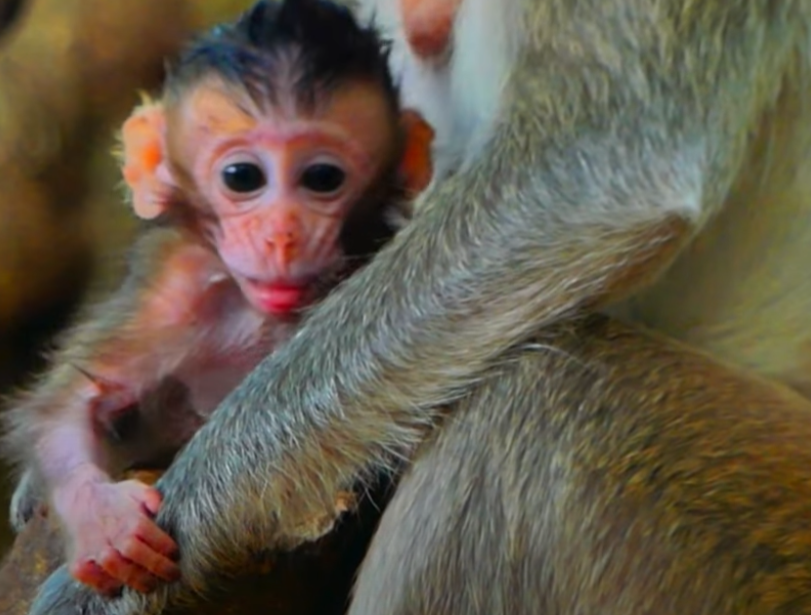It was just past dawn in the heart of Angkor Wat’s sacred forest. The mist still clung low to the jungle floor, and the air was filled with the rustling sounds of waking wildlife. Among the ancient trees, a tight-knit monkey troop stirred from their sleep—but what should’ve been a quiet morning turned into a scene of heartbreak and fear.
Baby Sani, barely a few weeks old, had been exploring a small bush near the roots of a banyan tree. With curiosity sparkling in his eyes, he clumsily reached for some leaves, unaware that this simple act would spark a moment of unexpected cruelty.
High above, Grandma Rina—a dominant, older female in the group—watched with narrowed eyes. For reasons only she understood, she saw Sani’s innocent action as a misstep. In a flash, she descended with surprising speed, her silvered fur shimmering in the dappled light.

Then, it happened.
With a loud bark-like shriek, Rina snatched Sani’s arm, pulling him back with force. The baby let out a terrified cry, his tiny body trembling violently. His eyes were wide with panic, his limbs shaking uncontrollably—not from injury, but from the emotional shock of being reprimanded so harshly by an elder he barely knew.
I was there, just a few feet away, camera in hand—but even I froze. The power dynamic between these monkeys, so raw and unfiltered, felt like something we humans rarely get to witness.
Sani’s mother, Mira, rushed in seconds later. But what shocked me most was her reaction—not to fight, not to rescue, but to pause. She stood barely a meter from her baby, ears pulled back, body lowered in a submissive crouch.
She was afraid. Afraid of Rina.
And that, perhaps, is what made the moment most tragic.
Sani, still whimpering, crawled toward his mother. But Rina stood her ground, sending another sharp sound of warning. Mira, now visibly shaking herself, hesitated—before turning slightly away, her eyes full of pain. She couldn’t defy the elder.
It was a moment of heartbreaking powerlessness.
I watched Sani curl into himself, clutching his belly, his tiny frame jerking with sobs that no mother comforted. His cries weren’t loud, but they cut deep. Every few seconds, he’d glance toward Mira, only to find her still frozen in fear.
Why did Grandma do it? Was it dominance? Misplaced frustration? Or simply the strict hierarchy of the wild? I may never know. But one thing was clear—Sani wasn’t just physically shaken. He was emotionally shattered. And Mira? She bore the guilt of not being able to protect him.
Minutes passed.
Finally, Rina turned away, disappearing into the underbrush. That’s when Mira bolted forward, scooping up her baby with both arms, cradling him tightly against her chest. She kissed his head. She stroked his back. But it was too late to erase what had happened. All she could do was hold him.
I lowered my camera and just watched.
The forest around them continued on like nothing had happened. Birds chirped. Sunlight danced. But in that small pocket of jungle, a wound had formed. One that may never fully heal.
In the coming hours, I noticed Sani wouldn’t play. He wouldn’t nurse. He only clung to Mira, his body limp. It reminded me so deeply of human children who suffer early trauma—the way they pull inward, lose trust, and seek comfort with quiet desperation.
I couldn’t help but feel a deep ache in my heart.
Not all stories in nature end with cuteness and laughter. Some remind us that family, even among wild monkeys, is complex. There are power struggles, misunderstandings, fear, and heartbreak. But there’s also love.
Before I left the forest that evening, I saw Mira once again stroking Sani’s cheek. He had finally started to calm, though his eyes still looked distant.
Maybe, with time, that little heart would heal. Maybe tomorrow, he’d laugh again.
But I’ll never forget the look on his face that morning. The moment a child’s trust was broken… and a mother stood helpless to stop it.